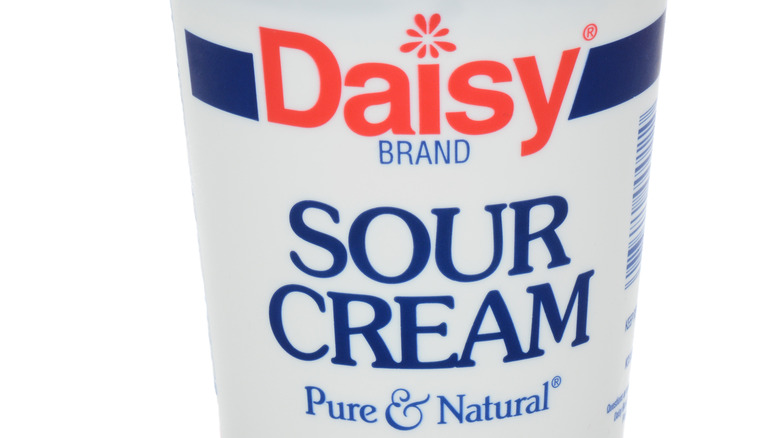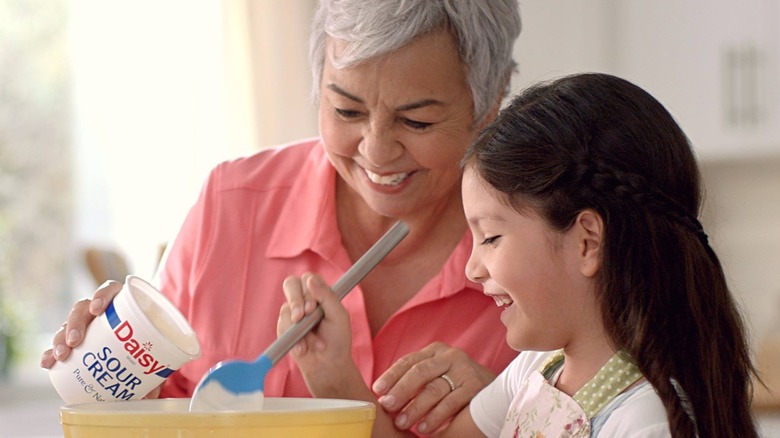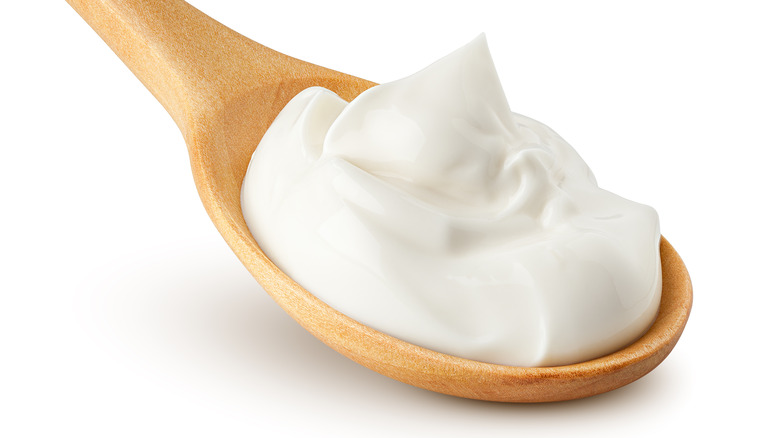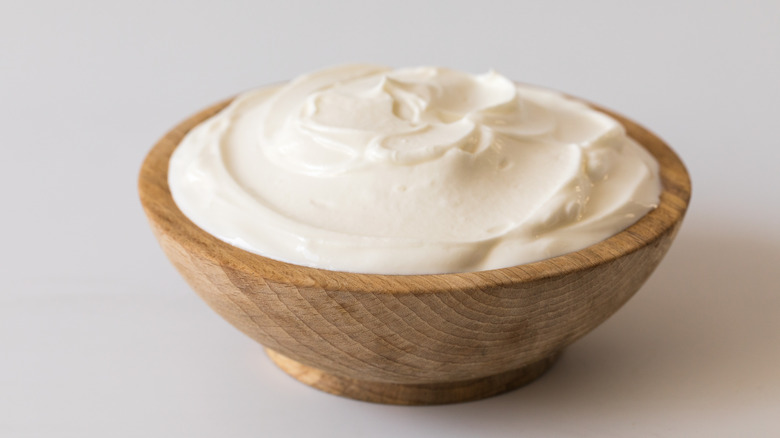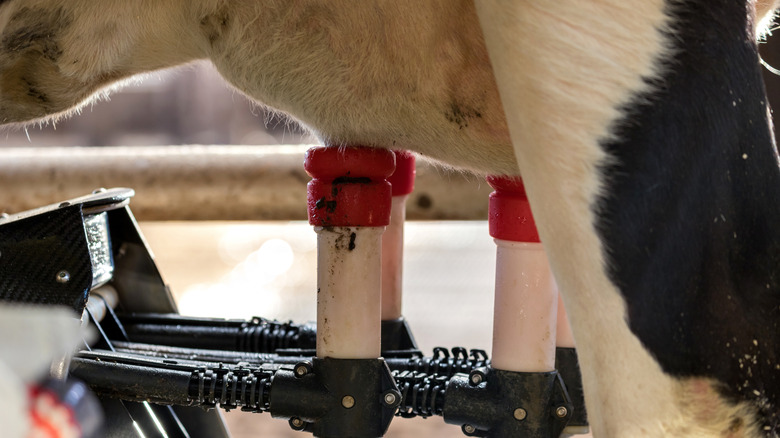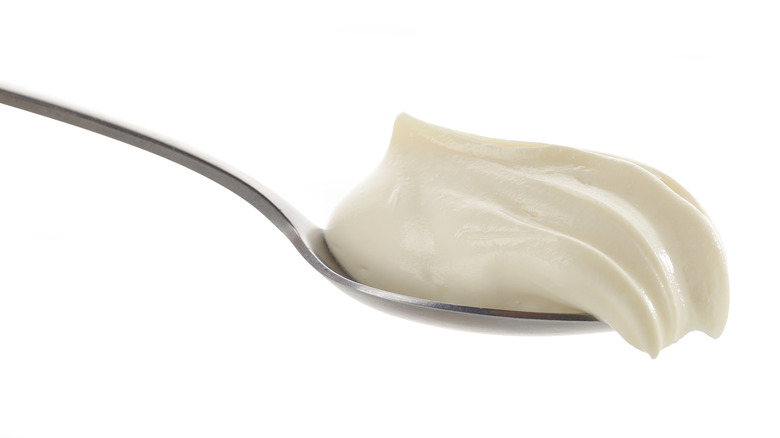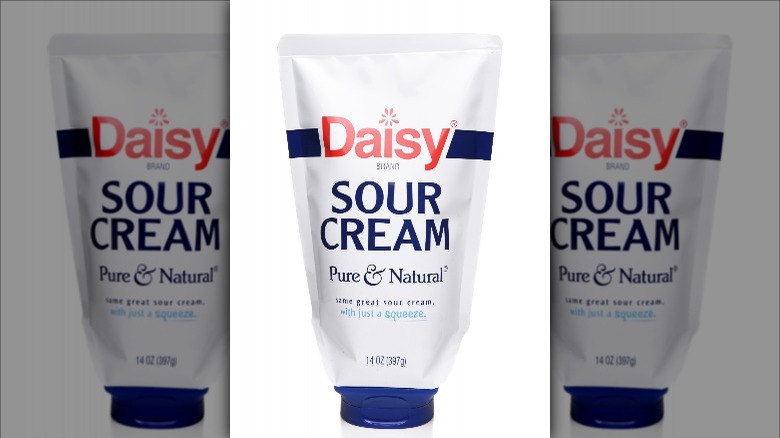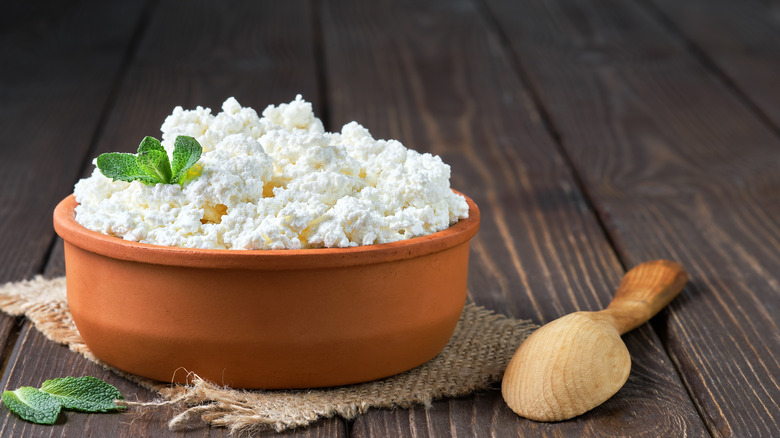The Untold Truth Of Daisy's Sour Cream
There's so much you can do with a dollop of Daisy! The time-honored jingle of this all-American sour cream company is apt, as Daisy's sour cream is a deliciously versatile treat, marrying just as well with savory as sweet ingredients. Sour cream is, as its name suggests, a cultured or acidified cream. Most sour cream, according to Real California Milk, is made by way of the former process: Lactic acid bacteria (aka Streptococcus lactis — don't worry, it's one of the good-for-you bacteria!) is added to pasteurized cream in order to thicken it and lend a slightly sour flavor. The versatile ingredient but can be used for a number of dishes including soups and stews, dips and salad dressings, tacos and baked potatoes, and even desserts.
It's no wonder Daisy has settled on such a deliciously true jingle! But beyond that catchy song, there is much more to the company and its signature offering. This is the untold truth of Daisy's sour cream.
Daisy has been family owned and operated for five generations
Daisy sour cream may seem like a massive corporation, given its prominent grocery shelf space and omnipresence in television advertising, but the company is actually family-owned and operated and has been since its first founding over 100 years ago. Daisy's story begins with Russian immigrant Morris Sokolsky. According to Grocery.com, Morris' son Louis lost quite a bit of money in real estate investments. To help him out, Morris gave his son a horse and buggy that would become Louis' bread and butter — literally. Louis began delivering fresh milk and dairy throughout his hometown of Chicago, paving the way for the Daisy Brand company which was previously known as the National Cheese Company (via Chicago Tribune).
For five generations, since its humble beginnings in 1917, the operation has been kept in the family (via Daisy). The company withstood not just the Great Depression, but a massive fire in the early '70s, per Grocery.com, which led Louis' son and successor Burton Sokolsky to relocate from Chicago to Dallas, where he would officially found Daisy Brand (via Texas Jewish Post). Since assuming the role of president, David Sokolsky, Burton's son, has opted to focus on new technologies to improve the product for sour cream lovers across the country.
It's one of the largest dairy processors in the nation
Daisy Brand is the nation's largest sour cream manufacturer, according to Dennis Group, and currently ranks 41 on Dairy Foods Magazine's list of the top 100 dairy processors in North America. Its ever-increasing success has led the company to open new plants in Ohio, Arizona, and other states, in order to better serve local markets (via Dennis Group).
According to Dairy Foods Magazine, the pandemic and subsequent social distancing and shelter-at-home measures only further contributed to the popularity of cultured dairy, due in part to the fact that being at home led folks to cook and bake more than they usually would. In 2021, dollar sales for Daisy Brand reached a whopping $800.8 million (more than twice that of the second ranking private label, according to Chicago-based market research firm IRI). This reflected a more than 20% increase, as compared to 2020.
Daisy sour cream is keto-friendly
In addition to a rise in at-home baking, the ever-increasing popularity of the keto diet is certainly one contributing factor to Daisy's prominence. The keto diet (keto is short for ketogenic) is a popular low-carb, high-fat diet which offers a variety of health benefits including weight loss and reduced risk of diabetes, cancer, epilepsy, and Alzheimer's disease. The idea behind the ketogenic diet is to push your body into a phase of ketosis, which leads you to metabolize fat rather than carbs for energy.
Sour cream, Healthline notes, is indeed keto-friendly — particularly the full-fat standard preparation, which has no added sugar or starch, seeing as it's thickened entirely with fat and acid. (To get the same texture, the outlet explains, low-fat and nonfat versions must rely on thickeners and gums derived from carbs). Daisy sour cream, then, is the ideal addition to keto-friendly recipes like mashed cauliflower as well as gratins and creamed spinach which are great options for low-carb holiday side dishes.
Daisy has had its share of animal rights controversy
Given its family-run, family-focused image, not to mention its 2008 American Business Ethics award (via Grocery.com), it may be surprising to learn that everything isn't sunshine and rainbows at Daisy Brand. Specifically, the company came under fire back in 2015 for alleged animal abuse at one of its farms.
The allegations, CBS News reports, came from a former employee of Daisy Brand's Paris, Texas-based Daisy Farms. The former employee sent "disturbing video" to PETA depicting "cows and calves who were sick with pneumonia and struggling to breathe," Dan Paden, associate director of evidence analysis in PETA's cruelty investigations department, told the outlet. PETA has since published these and other harrowing images on its website. (Trigger warning: it's pretty gruesome!)
Following the allegations, the company investigated and subsequently terminated the employee who had been mistreating animals in the video and promised to hire a third party welfare audit firm to explore the other accusations. But PETA — and the employee who sent the video in the first place — remained skeptical, maintaining that the abuse in the video was far from an isolated case.
Daisy is shifting to more humane milking methods
Following the abuse allegations and an investigation from PETA, Daisy Farms has notably refocused its efforts on new technologies that help make its practices more humane. This includes using milk supplied by dairy farmer Adam Wolf, who, last spring, installed 12 state-of-the-art milking robots in one of his barns, making his dairy one of the state's first to use such advanced technology. The automated milking, he tells Spectrum Local News, is an ultra hygienic alternative to other milking possibilities, and it also keeps the animal's needs at the forefront: Indeed, he says, it actually allows the cows to choose when and how often they want to be milked.
As a result, Wolf tells the outlet, "My cows in this barn, they're not scared of humans. They don't turn around and run away, they kind of want to see 'hey, what's going on, come pet me, let me lick you.'" It's a step in the right direction for the happier cows Daisy Brand hopes to be known for.
Daisy's famous jingle is still going strong
Daisy Brand has long relied on marketing to improve its image. During the Great Depression, it was in large part thanks to creative advertising solutions, such as the release of mini porcelain butter churns, that the brand managed to stay relevant and, thus, afloat, according to Grocery.com. And the buck didn't stop with churns.
The "do a dollop" tagline is integral to Daisy Brand's advertising. According to the Auguste Escoffier School of Culinary Arts, it even made the (admittedly vague) measurement well-known among American cooks. The tagline and jingle accompanied the brand when it launched in Californian markets in the late '90s, according to Adweek, and it also appears in the "episodic" TV campaign launched in 2020 featuring the stories of consumers who frantically rush to the store upon realizing they're out of sour cream.
"For this new campaign we're telling a narrative story rooted in human truth," said Jason Geis, VP group creative director at Blue Chip (which has been running Daisy's advertising since 2017), in an interview with Little Black Book. "By using the jingle as a pneumonic, we tap the power in the brand's heritage and bridge the gap between classic and contemporary food advertising. And by building the stories around classic foods that go with sour cream, like tacos, we extend the visual heritage of the brand's advertising."
Daisy patented a unique flexible packaging option for easier portioning
While the "dollop" Daisy is known for has historically been portioned out with a spoon, in 2015, it engineered a new way to serve it: via a flexible, squeezable pouch. The proprietary packaging, according to Packaging Digest, is shaped in an inverted wedge and has a flip-top closure with a star-shaped hole for easy dolloping.
Dairy Reporter notes that the new packaging helps to provides a solution to the issue of cross-contamination. "The problem with the tub is, a lot of times, it makes its way to the very back of the refrigerator and people forget that it's there until they open it up and it's moldy," Aaron Heyniger, the sales director of the food and beverage category at Aptar, the company that designed the new pouch's award-winning technology, tells the outlet. "And when you're using it, you tend to have to scoop it on your taco, and now all of a sudden you've got your food into the sour cream."
According to Food Dive, the new packaging also has the added bonus of reducing waste. Not only does it minimize contact with air, but it also allows consumers to dispense every last dollop of Daisy.
Cottage Cheese is also part of Daisy's product line
While Daisy certainly made a name for itself with sour cream, according to a press release, in 2006 the company branched out into another cultured dairy product: cottage cheese. A longtime favorite of dieters, the low-calorie curd is an unaged, acid-coagulated cheese. Mild and slightly tangy, it can be enjoyed in either sweet or savory combinations: spooned into a cantaloupe, topped with fresh herbs, or even baked into a savory spinach pie.
Daisy Brand produces cottage cheese in several formats, including in single-serve cups and large, family-style containers. Its cottage cheese comes in either rich, creamy 4% or lighter 2% milkfat iterations. The brand even makes single-serve portions of cottage cheese with real fruit compote that can be stirred into the cheese, for the ideal sweet breakfast, snack, or healthier dessert option. It's the perfect way for this century-old company to expand into a new market.
